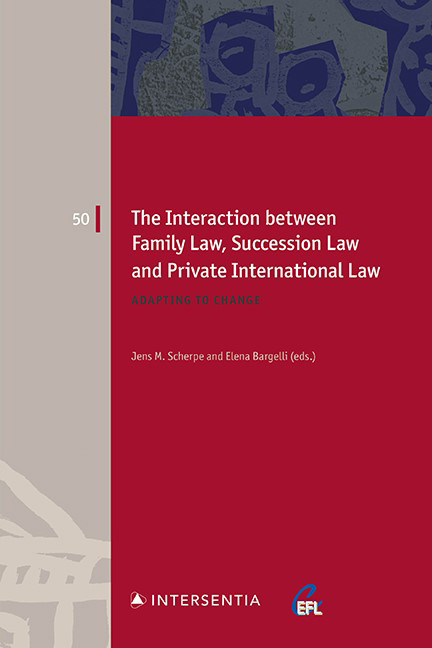Book contents
- Frontmatter
- Acknowledgements
- Contents
- List of Cases
- List of Contributors
- The Interaction between Family Law, Succession Law and Private International Law: An Introduction
- PART I THE IMPACT OF DEVELOPMENTS IN NATIONAL FAMILY LAWS ON EU PRIVATE INTERNATIONAL LAW
- PART II THE IMPACT OF EU PRIVATE INTERNATIONAL LAW ON NATIONAL FAMILY LAWS
- PART III THE IMPACT OF NATIONAL SUCCESSION LAWS ON EU PRIVATE INTERNATIONAL LAW
- PART IV THE IMPACT OF EU PRIVATE INTERNATIONAL LAW ON NATIONAL SUCCESSION LAWS
- Index
- European Family Law Series
Understanding and Interpreting the Succession Regulation through its National Origins
Published online by Cambridge University Press: 25 May 2021
- Frontmatter
- Acknowledgements
- Contents
- List of Cases
- List of Contributors
- The Interaction between Family Law, Succession Law and Private International Law: An Introduction
- PART I THE IMPACT OF DEVELOPMENTS IN NATIONAL FAMILY LAWS ON EU PRIVATE INTERNATIONAL LAW
- PART II THE IMPACT OF EU PRIVATE INTERNATIONAL LAW ON NATIONAL FAMILY LAWS
- PART III THE IMPACT OF NATIONAL SUCCESSION LAWS ON EU PRIVATE INTERNATIONAL LAW
- PART IV THE IMPACT OF EU PRIVATE INTERNATIONAL LAW ON NATIONAL SUCCESSION LAWS
- Index
- European Family Law Series
Summary
INTRODUCTION
The EU Succession Regulation unifies private international law and international procedural law. In addition, the Regulation creates the European Certificate of Succession. Substantive succession law and national procedural law remain unaffected. In accordance with Article 81 of the Treaty on the Functioning of the European Union, the EU Succession Regulation retains the Members States‘ legislative autonomy in the areas of substantive succession law and procedural law.
EU law and national law nevertheless influence each other. The aim of this chapter is to look at the impact of national substantive and procedural succession law on the EU Succession Regulation. The first part of the analysis (see section 2 below) deals with the impact of national law on the legislative debate which lead to the enactment of the Regulation. The legislative process involved the Commission‘s proposal as well as the approval of the EU Parliament and the Council of the European Union. For the purposes of analysing the impact of national law on the EU Succession Regulation, the discussion within the Council will be most relevant. The second part of the analysis (see section 3 below) focuses on the interpretation of the EU Succession Regulation in jurisprudence and academic literature. Augmenting the first part, the second part questions whether differences in national substantive and procedural law and the legislative history do and should play a role in the interpretation of the EU Succession Regulation.
LEGISLATIVE DEBATE
The talks within the Council of the European Union were not limited to technical topics such as the necessity of a cross-border element, the notion of habitual residence, the limits to party autonomy, renvoi, characterisation or public policy. Rather, the Member States‘ concerns about their national concepts in the areas of substantive succession law and procedural law shaped large parts of the discussion. Compromises were particularly difficult to reach where national concepts differ quite considerably from each other. I will highlight three points, one procedural and two substantive: the competence of national authorities in matters of succession (see section 2.1 below), the compulsory portion of close family members (see section 2.2 below) and lifetime gifts (see section 2.3 below).
- Type
- Chapter
- Information
- The Interaction between Family Law, Succession Law and Private International LawAdapting to Change, pp. 139 - 154Publisher: IntersentiaPrint publication year: 2021



